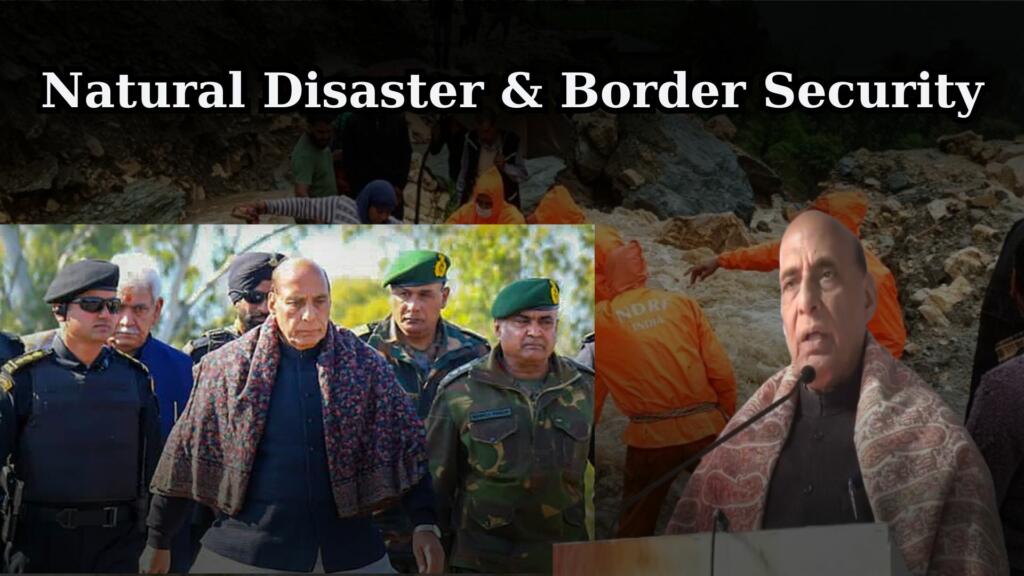India’s vulnerability to natural disasters, particularly in its border states, has surged in recent years, raising concerns about the intricate connection between these catastrophic events and national security. Defence Minister Rajnath Singh has sounded an alarm, suggesting that external forces, possibly hostile nations, might be manipulating weather patterns to disrupt and destabilize border regions. This unsettling possibility has prompted Singh to call for a comprehensive study to unravel the complex web linking natural disasters and national security. The escalation in both the frequency and intensity of these disasters poses multifaceted threats, from crippling infrastructure to diverting security resources, making it imperative for the government to adopt proactive measures. This article delves into the urgent need for a thorough investigation and proposes strategic actions to fortify India’s national security against the forces of nature and potential external influences.
Natural Disasters on the Rise
The Indian subcontinent, with its expansive coastline and mountainous terrain, has long been prone to a range of natural disasters, including cyclones, floods, earthquakes, and landslides. In recent years, however, there has been a noticeable uptick in both the frequency and intensity of these events, especially in the border states. This concerning trend has sparked discussions about its potential impact on national security.
Defence Minister’s Alarming Allegation
Defence Minister Rajnath Singh has voiced apprehensions that some of these disasters might not be solely weather-related. He has raised the specter of external forces, potentially enemy nations, manipulating weather patterns to cause disruptions and destabilize border regions. This serious allegation underscores the need for a comprehensive investigation into the link between natural disasters and national security.
The National Security Implications
Natural disasters, beyond causing immediate destruction, can pose a significant threat to India’s national security. The potential to cripple infrastructure, disrupt communication networks, displace populations, and create chaos makes border areas susceptible to infiltration and attacks. Additionally, diverting the attention and resources of security forces during disaster response can compromise the ability to address conventional threats. Economic losses further weaken the country’s overall preparedness and resilience.
Government’s Response and Defence Minister’s Call to Action
While the Indian government has already taken steps to mitigate the impact of natural disasters in border areas, Defence Minister Singh’s concerns necessitate a more robust approach. His call for a comprehensive study signifies the urgency of understanding the potential external manipulation of weather patterns and broader factors contributing to disasters in border regions.
A Multidisciplinary ApproachThe Proposed Study
The study proposed by Rajnath Singh should be a multi-pronged effort, enlisting expertise from meteorology, geology, intelligence, and national security. Beyond investigating external manipulation, it should explore broader factors like deforestation and climate change contributing to natural disasters in border regions. This multidisciplinary approach ensures a comprehensive understanding of the complex dynamics at play.
Proactive Measures for National Security
In addition to the study, the government should take proactive measures to safeguard national security in the face of natural disasters. Strengthening border security through increased troop deployment and enhanced surveillance, investing in disaster-resistant critical infrastructure, and developing community resilience are crucial steps.
Strengthening Border Security
To bolster security in vulnerable areas, increased troop deployment and the use of advanced surveillance equipment are essential. Improved coordination between different security agencies is crucial for a unified and effective response to potential threats arising from natural disasters.
Investing in Critical Infrastructure
Building resilient infrastructure, including roads, bridges, and communication towers capable of withstanding natural disasters, is imperative. This investment ensures that even in the aftermath of a disaster, essential communication and transportation channels remain operational.
Developing Community Resilience
Empowering local communities through education on disaster preparedness and response measures is key. Providing resources to aid recovery efforts strengthens community resilience and enhances the overall ability to cope with the aftermath of natural disasters.
Conclusion: Safeguarding National Security Against Nature’s Fury
The link between natural disasters and national security is a complex challenge that demands immediate attention. Defence Minister Rajnath Singh’s call for a comprehensive study and the proposed proactive measures underscore the government’s commitment to ensuring that the forces of nature do not compromise India’s national security. By understanding the intricate dynamics and taking strategic actions, India can fortify its defenses against both natural calamities and potential external manipulations.
Source: ANI News
